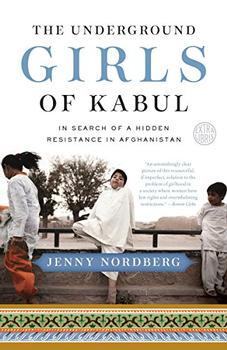Reading Guide Questions

Please be aware that this discussion guide will contain spoilers!
- The Underground Girls of Kabul features several women who find ways to resist and subvert power—including Azita, whose status is elevated by disguising her daughter as a son; Mehran, who is able to confidently roughhouse with boys her own age; and Zahra, who fights her parents to maintain her male identity after puberty. Which woman's story did you find most interesting? Why?
- Although Afghanistan and its conflicts have been well-covered, the book offers a different entry point into the lives of people there. Before reading this book what (if anything) did you know about Afghanistan? What did you find surprising about the country and its history in reading this book?
- Do you think the practice of bacha posh is subversive, with the potential to change the strict gender culture of Afghanistan? Or do you see it as women capitulating to and reinforcing a system of segregation?
- Some of the girls who are raised as bacha posh do not want to go back to living as women. How do you think you would react if you were in their position?
- After reading the book, does the practice of bacha posh make sense to you or is it entirely foreign? How would you explain why this happens?
- The author outlines a pervasive culture of violence and extreme segregation. Which part of the story, if any, made you angry? Why?
- What historical and current-day parallels to bacha posh, pretending to be someone or something else due to segregation or oppression can you think of: real or fictional, in different countries, for different reasons?
- Are the lives of Afghan women entirely different from those of women in the West, or do you see similarities in how we behave and how we live? What are those?
- Do you agree that there is also a "culture of honor" in our society, where girls should be pure and boys should be aggressive and protective? Where do you see examples of that in the reporting of daily news or in your own life?
- Many of the women in this book experience the limits of female freedom, even if they have had success. For example, Azita has risen from a small Afghan village to occupy a place in parliament, but she is still very limited in what she can do and how far she can reach. Is there a limit to how far most women can get in our own society today? Why is that?
- In an interview about the book, Jenny Nordberg said that the story of the bacha posh "cuts right to the most difficult questions of human existence: war, oppression, and the difference between men and women." Do you agree? Why are the differences between men and women so important to us?
- Jenny Nordberg raises questions about whether or not gender is dichotomous, and she even calls bacha posh "a third kind of child"—neither boy nor girl. What do you think: Are we born a certain way or do we become our gender?
- Under what circumstances would you consider raising a daughter as a son? And in what situation or circumstance could you imagine disguising yourself in exchange for greater freedom?
- Did you ever wonder how things would have been different had you been born a child of the other gender? Did you ever wish, at any stage in your life or in a particular circumstance, that you could be a different gender?
- For the female reader: Did you ever dress in a less feminine and more traditionally male or conservative way to be taken seriously? Why is that important?
- For the male reader: What traits that are considered traditionally female have you ever wished you could display more openly, if any? Do you feel a pressure to appear manly in the sense of protecting one's family; to appear capable; et cetera?
- In what way were you treated like a boy or a girl, respectively, when you were little? Were there things you absolutely couldn't do due to your gender? Do you see a future in which gender roles will be less strict, and how is that a good or a bad thing for men and women?
- Do you agree with the author's conclusion that women's rights are essential to human rights and to building peaceful civilizations? Why or why not?
- What would you tell the author or any of these women? They would love to hear from you. We invite you to continue the conversation on bachaposh.com or to connect with Jenny Nordberg on Twitter: @nordbergj
Unless otherwise stated, this discussion guide is reprinted with the permission of Crown.
Any page references refer to a USA edition of the book, usually the trade paperback version, and may vary in other editions.

 Book Reviewed by:
Book Reviewed by:



